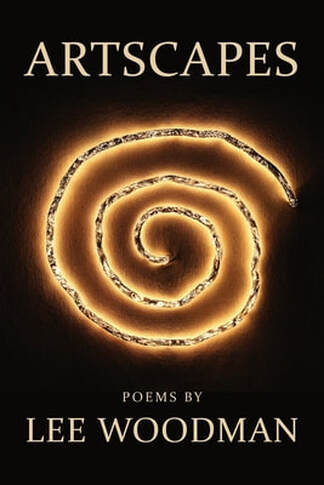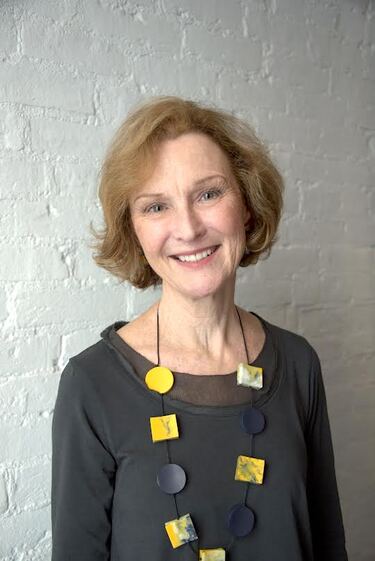|
Artscapes, by Lee Woodman Shanti Arts, 2021 We are very excited that a beloved ekphrastic poet has a new collection out! It was wonderful to connect with Lee Woodman about her new book from Shanti Arts Publishing. You can learn more about this incredible writer at https://www.poetleewoodman.com. The Ekphrastic Review: You say that when it comes to ekphrastic writing, you don’t choose the art, it chooses you. How does that happen? What do you experience? From childhood I have been fascinated with artworks and evocative language. I find it strange but thrilling when a sculpture beckons, a painting demands I pay attention, or a piece of music asks: "You know what I'm talking about?" Through poetry, I invite readers to walk with me into paintings, time travel through sculpture, and eavesdrop on conversations I have with artists. I experience a somewhat out-of-this-world feeling—a sense of entering a new space created by an artist’s use of color, texture, shape. They often introduce ideas or dreams that are novel, which inspire me to try out poetic forms that fit the content. A bronze globe sculpture, a huge chalk drawing of an avalanche, a Greek god striking his trident—all provide image and metaphor. Then I try to follow suit with my own interpretations through lyrics and wordplay. You’ve been writing or thinking about visual art for a long time, in your production work for major institutions. How has writing poetry about art changed the way you work or reflect? I majored in Art in College. I had intended to major in French, but when I took my first Art History course, I was completely smitten. I loved the way art forms changed with society over time—the influence of politics, wars, psychiatry, science, and literature in turn influenced the way artists approached life and various materials. At the Smithsonian Institution, in my career as a radio and television producer, I had to do a different kind of looking, listening, and planning. The editing process made me aware of the importance of getting down to the essential message of the program. Working at Library of Congress in the Veterans History Project, I learned how to ask leading questions about the effects of war to make a radio series broadcast on Public Radio International. Writing poetry makes me appreciate how I have had to look and listen to specifics. The more exact a poet can be with word choice and line breaks and the better the metaphors—the more universal the meaning of the poem becomes. Does a poem just spill out? Do you have long conversations with the artwork in person before you begin? Do you wait in for something to form, or do you have ways to compel that to happen? Tell us about your process when it comes to ekphrastic writing. It’s quite rare for me that a poem just spills out. I stare and stare at the artwork that compels me. I usually write thoughts and reactions in a notebook. Then I go back over the notes and highlight the “hot” spots or phrases that “rattle.” Very often, I go online to research the artist or the particular piece that intrigues me. I find the back stories of their lives and impulses fascinating. I think about what the artists have done with content and then reflect on the best poetic form to echo that. When you say you want your poetry, and poetry in general, to make others see art differently, what do you mean? How do you see art differently, and how will your poetry take us there? I think many people are confused by art and poetry. They assume it is difficult to understand or that their personal reactions are not valid. When I explain how I look at art or how I read a poem, it becomes more fun for them. I ask, “What do you notice? What do you wonder? What stays with you over time?” Then both children and adults realize how delightful the experience can be, and they burst forth with personal stories and reactions. That is really rewarding. Which of the poems in your book was the most difficult to write? Tell us the story behind that. The poem about Bosch’s Garden of Earthly Delights was challenging. After I stared at all parts of the triptych, and researched Bosch’s work in much more depth, I realized that if I looked at the work starting from the panel on the far right and traveled backward through the centre to the panel on the left, that I interpreted the whole work in an unusual way. It has been seen by historians and theorists as a reflection of Middle Age beliefs in sin and damnation; however, as pure art, it is a miraculous exercise of graphic dancing, dreamlike creatures, weird human physicality, and bountiful colour. I attempted to bring all of that ambiguity into the free form I chose for the poem. What are a few of your favourite artworks of all time, and why? I love Surrealists through time—as long ago as Bosch and then coming up through Dali, Picasso, Miró and into contemporary artists’ work. One of my very favourite paintings is Chagall’s Paris Through the Window, 1913. It is such an extraordinary mix of sheer colour, dreams, and imagery from his family life. I consider young Gabrielle Widjaja’s Dance, 2020 as surreal in its recapture of Chinese imagery and tradition. It spurred me to write a composite poem, half rondel, half free verse. I also see Agnieszka Nienartowicz's The Garden of Earthly Delights, 2017 as recapture of Bosch’s work redone as a painting of a tattoo on a young woman’s back! When artists are called “Surrealists” during their time, they often rebel because they have already moved on to a different way of making art. I think that is wonderful because after all, creators— whether sculptors, musicians, painters, or multimedia immersive artists—all stand on each other’s backs while bringing something fresh and new to the world. Lee reads a poem from her book.
0 Comments
Your comment will be posted after it is approved.
Leave a Reply. |
The Ekphrastic Review
COOKIES/PRIVACY
This site uses cookies to deliver your best navigation experience this time and next. Continuing here means you consent to cookies. Thank you. Join us on Facebook:
July 2024
|





